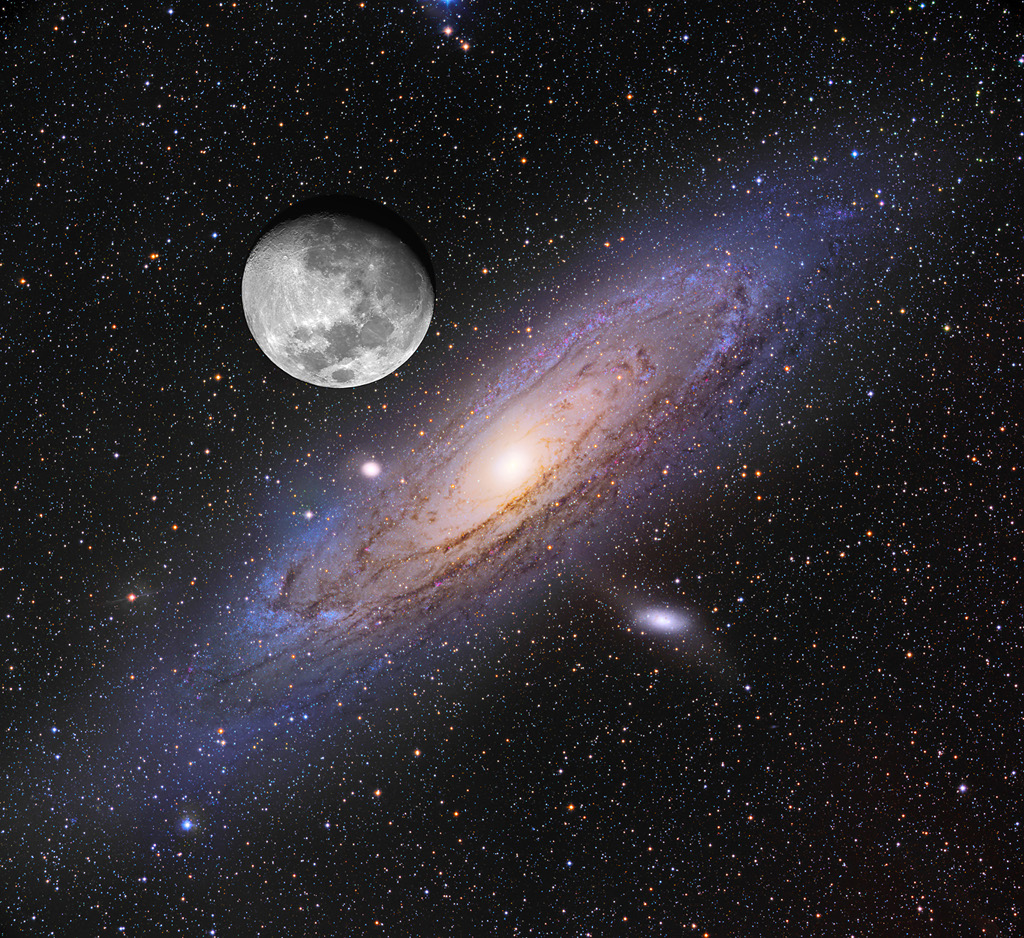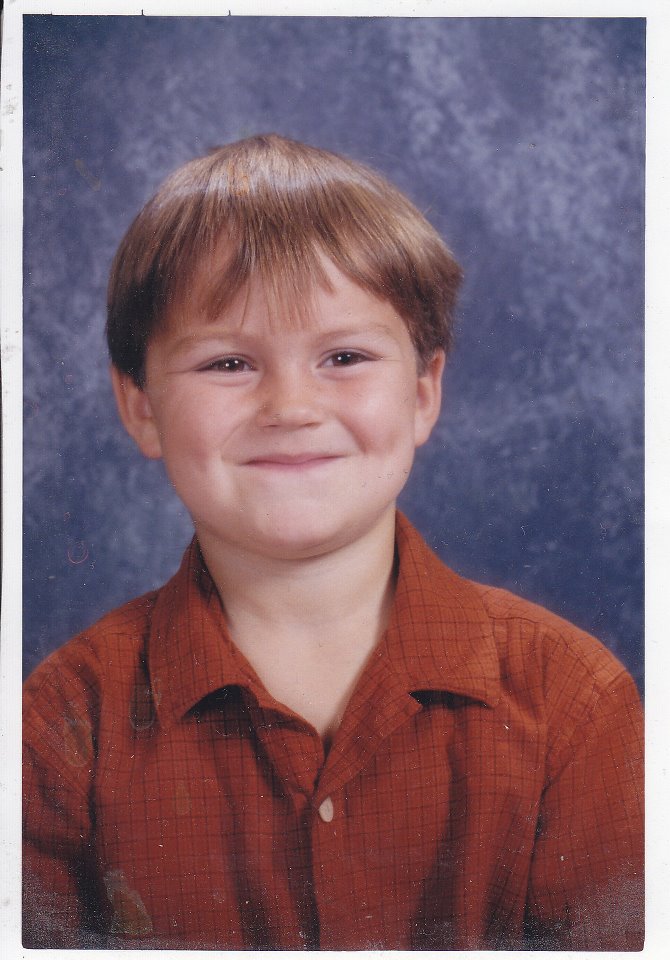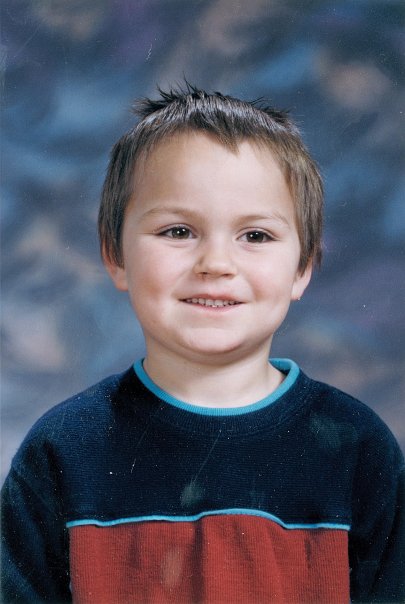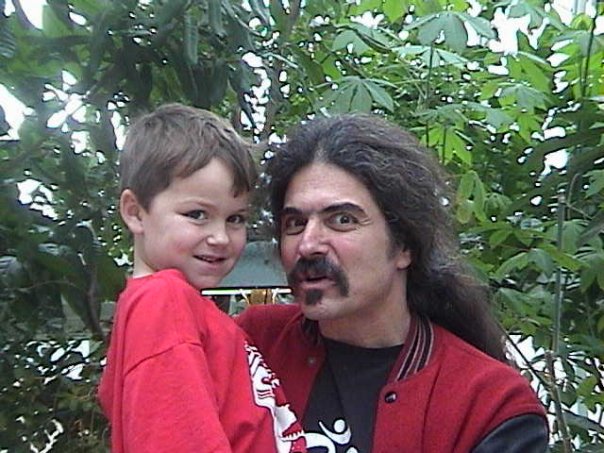Blog
The Great Spiral Galaxy in Andromeda (also known as M31), a mere 2.5 million light-years distant, is the closest large spiral to our own Milky Way. Andromeda is visible to the unaided eye as a small, faint, fuzzy patch, but because its surface brightness is so low, casual skygazers can’t appreciate the galaxy’s impressive extent in planet Earth’s sky. This entertaining composite image compares the angular size of the nearby galaxy to a brighter, more familiar celestial sight. In it, a deep exposure of Andromeda, tracing beautiful blue star clusters in spiral arms far beyond the bright yellow core, is combined with a typical view of a nearly full Moon. Shown at the same angular scale, the Moon covers about 1/2 degree on the sky, while the galaxy is clearly several times that size. The deep Andromeda exposure also includes two bright satellite galaxies, M32 andM110 (below and right).

John Taylor (25 September 1942 – 17 July 2015) was a British jazz pianist born in Manchester, England, who occasionally performed on the organ and the synthesizer.
John Taylor was a self taught pianist. With his family, he moved from Manchester, first to the Midlands and then to Hastings where he played locally. In 1964 Taylor became a civil servant, moved to London and became involved in the free jazz scene.
Taylor first came to the attention of the jazz community in 1969 when he partnered with saxophonists Alan Skidmore and John Surman. He was later reunited with Surman in the short-lived group Morning Glory and in the 1980s with Miroslav Vitous‘s quartet. In the early 1970s, Taylor was accompanist to the singer Cleo Laine and started to compose for his own sextet. He also worked with many visiting artists at Ronnie Scott’s Jazz Club in London, and later became a member of Scott’s quintet.
more...Roosevelt Melvin “Booba” Barnes (September 25, 1936 – April 2, 1996) was an American Delta blues guitar player and vocalist. One commentator noted that Barnes, R. L. Burnside, Big Jack Johnson, Paul “Wine” Jones and James “Super Chikan” Johnson were “present-day exponents of an edgier, electrified version of the raw, uncut Delta blues sound.”
Born in Longwood, Washington County, Mississippi, United States, Barnes got his start in 1960 as a member of the Swinging Gold Coasters, a local Mississippi blues outfit. He relocated to Chicago in 1964, where he played in bars and clubs, but returned to Mississippi in 1971 and continued to perform locally into the early 1980s. In 1984, Barnes hooked up with Lil’ Dave Thompsonwhen the latter was aged 15, and the duo played on Mississippi’s juke joint circuit. Barnes opened a nightclub, the Playboy Club, in 1985, and played there with a backing group called the Playboys; they became regional blues favorites, and eventually signed to Rooster Blues, who released Barnes’s debut effort in 1990. The album was hailed by Allmusic as “an instant modern classic”, and Guitar Player called Barnes “a wonderfully idiosyncratic guitar player and an extraordinary vocalist by any standard”.Barnes toured the U.S. and Europe following the album’s release. Barnes’s career was interrupted in the middle of the decade when he was diagnosed with lung cancer, and he died of the disease in April 1996 in Chicago, aged 59.
more...Glenn Herbert Gould (/ɡuːld/; 25 September 1932 – 4 October 1982) was a Canadian classical pianist. He was one of the best known and most celebrated pianists of the 20th century, and was renowned as an interpreter of the keyboard works of Johann Sebastian Bach. Gould’s playing was distinguished by a remarkable technical proficiency and a capacity to articulate the contrapuntal texture of Bach’s music.
Gould rejected most of the standard Romantic piano literature by Chopin, Liszt, and others, in favour of Bach and Beethoven mainly, along with some late-Romantic and modernist composers. Although his recordings were dominated by Bach and Beethoven, Gould’s repertoire was diverse, including works by Mozart, Haydn, and Brahms; pre-Baroque composers such as Jan Pieterszoon Sweelinck and Orlando Gibbons; and 20th-century composers including Paul Hindemith, Arnold Schoenberg, and Richard Strauss. Gould was known for his eccentricities, from his unorthodox musical interpretations and mannerisms at the keyboard to aspects of his lifestyle and behaviour. He stopped giving concerts at the age of 31 to concentrate on studio recording and other projects.
Gould was also a writer, broadcaster, composer and conductor. He was a prolific contributor to musical journals, in which he discussed music theoryand outlined his musical philosophy. He performed on television and radio, and produced three musique concrète radio documentaries called the Solitude Trilogy, about isolated areas of Canada.
more...Samuel Carthorne Rivers (September 25, 1923 – December 26, 2011) was an American jazz musician and composer. He performed on soprano and tenor saxophones, bass clarinet, flute, harmonica and piano.
Active in jazz since the early 1950s, he earned wider attention during the mid-1960s spread of free jazz. With a thorough command of music theory, orchestration and composition, Rivers was an influential and prominent artist in jazz music.
Rivers was born in El Reno, Oklahoma. His father was a gospel musician who had sung with the Fisk Jubilee Singers and the Silverstone Quartet, exposing Rivers to music from an early age. His grandfather was Marshall W. Taylor, a religious leader from Kentucky. Rivers was stationed in California in the 1940s during a stint in the Navy. Here he performed semi-regularly with blues singer Jimmy Witherspoon. Rivers moved to Boston, Massachusetts in 1947, where he studied at the Boston Conservatory with Alan Hovhaness. He performed with Quincy Jones, Herb Pomeroy, Tadd Dameron and others.
more...Dmitri Dmitriyevich Shostakovich (Russian: ![]() Дмитрий Дмитриевич Шостакович (help·info), tr. Dmitriy Dmitrievich Shostakovich, pronounced [ˈdmʲitrʲɪj ˈdmʲitrʲɪjɪvʲɪtɕ ʂəstɐˈkovʲɪtɕ]; (25 September [O.S. 12 September] 1906 – 9 August 1975) was a Soviet-Russian composer and pianist. He is regarded as one of the major composers of the 20th century, with a unique harmonic language and a historic importance due to his years of work under Stalin.
Дмитрий Дмитриевич Шостакович (help·info), tr. Dmitriy Dmitrievich Shostakovich, pronounced [ˈdmʲitrʲɪj ˈdmʲitrʲɪjɪvʲɪtɕ ʂəstɐˈkovʲɪtɕ]; (25 September [O.S. 12 September] 1906 – 9 August 1975) was a Soviet-Russian composer and pianist. He is regarded as one of the major composers of the 20th century, with a unique harmonic language and a historic importance due to his years of work under Stalin.
Shostakovich achieved fame in the Soviet Union under the patronage of Soviet chief of staff Mikhail Tukhachevsky, but later had a complex and difficult relationship with the government. Nevertheless, he received accolades and state awards and served in the Supreme Soviet of the RSFSR (1947) and the Supreme Soviet of the Soviet Union (from 1962 until his death).
A polystylist, Shostakovich developed a hybrid voice, combining a variety of different musical techniques into his works. His music is characterized by sharp contrasts, elements of the grotesque, and ambivalent tonality; he was also heavily influenced by the neoclassical style pioneered by Igor Stravinsky, and (especially in his symphonies) by the late Romanticism of Gustav Mahler.
Shostakovich’s orchestral works include 15 symphonies and six concerti. His chamber output includes 15 string quartets, a piano quintet, two piano trios, and two pieces for string octet. His solo piano works include two sonatas, an early set of preludes, and a later set of 24 preludes and fugues. Other works include three operas, several song cycles, ballets, and a substantial quantity of film music; especially well known is the “Waltz No. 2” from the Suite for Variety Orchestra, as well as the suite of music extracted from The Gadfly.
more...Soleares is often referred to as the mother of all flamenco forms because so many other important forms are derived from it. It may be more accurate to think of soleares as the most flamenco of flamenco forms. All the elements of soleares, including its 12-count compás with an irregular beat structure, its Andalusian cadence, and its melodic and melissmatic gestures are unique to flamenco. Soleares first evolved in the late 18th Century from a dance form called Jaleo. As it evolved through the 19th Century, it took on a more solemn, cante jondo character, probably due to its inclusion in the Cafés Cantantes as a featured song and flamenco dance. Various forms of soleares developed associated with different cities and individuals. At the beginning of the 20th Century new forms were derived from soleares, including bulerías and soleá por bulerías. A common belief is that the word soleares is derived from the Spanish word soledad, or sorrow. Sorrowful, unrequited love is a main theme of the letras, along with other bittersweet lamentations.
more...Look through the cosmic cloud cataloged as NGC 281 and you might miss the stars of open cluster IC 1590. But, formed within the nebula, that cluster’s young, massive stars ultimately power the pervasive nebular glow. The eye-catching shapes looming in this portrait of NGC 281 are sculpted columns and dense dust globules seen in silhouette, eroded by intense, energetic winds and radiation from the hot cluster stars. If they survive long enough, the dusty structures could also be sites of future star formation. Playfully called the Pacman Nebula because of its overall shape, NGC 281 is about 10,000 light-years away in the constellation Cassiopeia. This sharp composite image was made through narrow-band filters, combining emission from the nebula’s hydrogen, sulfur, and oxygen atoms in green, red, and blue hues. It spans over 80 light-years at the estimated distance of NGC 281.

Theodore “Fats” Navarro (September 24, 1923 – July 6, 1950) was an American jazz trumpet player. He was a pioneer of the bebop style of jazz improvisation in the 1940s. He had a strong stylistic influence on many other players, including Clifford Brown.
Navarro was born in Key West, Florida, of Cuban, African, and Chinese descent. He began playing piano at age six, but did not become serious about music until he began playing trumpet at the age of thirteen. He was a childhood friend of drummer Al Dreares. By the time he graduated from Douglass High School, he wanted to be away from Key West and joined a dance band headed for the Midwest.
Navarro gained valuable experience touring in bands, including Snookum Russell‘s territory band, where he met and influenced a young J.J. Johnson. Tiring of the life on the road, Navarro settled in New York City in 1946, where his career took off. He met and played with, among others, Charlie Parker. But Navarro was in a position to demand a high salary and did not join one of Parker’s regular groups. He also developed a heroin addiction, tuberculosis, and a weight problem. (He was nicknamed “Fat Girl” due to his weight and high speaking voice.) These afflictions led to a slow decline in health. Navarro was hospitalized on July 1, 1950 and he died five days later on July 6 at the age of twenty-six. His last performance was with Charlie Parker on July 1 at Birdland.
Navarro played in the Andy Kirk, Billy Eckstine, Benny Goodman, and Lionel Hampton big bands, and participated in small group recording sessions with Kenny Clarke, Tadd Dameron, Eddie “Lockjaw” Davis, Coleman Hawkins, Illinois Jacquet, Howard McGhee, and Bud Powell.
more...Jack Costanzo (September 24, 1919 – August 18, 2018) was an American percussionist.
A composer, conductor and drummer, Costanzo is best known for having been a bongo player, and was nicknamed “Mr. Bongo”. He visited Havanathree times in the 1940s and learned to play Afro-Cuban rhythms on the bongos and congas.
Costanzo started as a dancer, touring as a team with his wife before World War II. After his discharge from the Navy, he worked as a dance instructor at the Beverly Hills Hotel, where Latin band leader Bobby Ramos heard Costanzo playing bongos in a jam session and offered him a job. Throughout the 1940s, Costanzo worked with several Latin bands, including a revived version of the Lecuona Cuban Boys, Desi Arnaz, and Rene Touzet.
Costanzo toured with Stan Kenton from 1947–48 and occasionally in the 1950s, and played with Nat King Cole from 1949 to 1953. He also played with the Billy May Orchestra, Peggy Lee, Danny Kaye, Perez Prado, Charlie Barnet, Pete Rugolo, Betty Grable, Harry James, Judy Garland, Patti Page, Jane Powell, Ray Anthony, Martin & Lewis, Frances Faye, Dinah Shore, Xavier Cugat, Frank Sinatra, Tony Curtis, and Eddie Fisher.
Costanzo formed his own band in the 1950s which recorded and toured internationally. Many Hollywood stars studied bongos with him, including Marlon Brando, Rita Moreno, Carolyn Jones, Hugh O’Brian, Keenan Wynn, Van Johnson, Tony Curtis, Betty Grable, Vic Damone, James Dean, and Gary Cooper.
more...Lemon Henry “Blind Lemon” Jefferson (September 24, 1893 – December 19, 1929) was an American blues and gospel singer-songwriter and musician. He was one of the most popular blues singers of the 1920s and has been called the “Father of the Texas Blues“.
Jefferson’s performances were distinctive because of his high-pitched voice and the originality of his guitar playing. His recordings sold well, but he was not a strong influence on younger blues singers of his generation, who could not imitate him as easily as they could other commercially successful artists. Later blues and rock and roll musicians, however, did attempt to imitate both his songs and his musical style.
Jefferson was born blind, near Coutchman, Texas. He was the youngest of seven (or possibly eight) children born to Alex and Clarissa Jefferson, who were African-American sharecroppers. Disputes regarding the date of his birth derive from contradictory census records and draft registration records. By 1900, the family was farming southeast of Streetman, Texas. Jefferson’s birth date was recorded as September 1893 in the 1900 census. The 1910 census, taken in May, before his birthday, confirms his year of birth as 1893 and indicated that the family was farming northwest of Wortham, near his birthplace.
more...born 9-23-95 died 6-5-2002 Diego was a radiant beam of pure Love and inexhaustible energy. His excitement for life was as contagious as his beautiful smile. One could see the unfolding Love of the Universe while gazing in his intense eyes. His gifts of Loving, Caring and Care taking others were abundant and generous. I will never forget his Laughter, Goofiness, Drumming, Hugging, Holding and Kissing.
https://diego-labriola.virtual-memorials.com/main.php?action=view&mem_id=6547&page_no=1




Messier 88 (also known as M88 or NGC 4501) is a spiral galaxy about 50 to 60 million light-years away in the constellation Coma Berenices. It was discovered by Charles Messier in 1781. M88 is one of the fifteen Messier objects that belong to the nearby Virgo Cluster of galaxies. It is galaxy number 1401 in the Virgo Cluster Catalogue (VCC) of 2096 galaxies that are candidate members of the cluster. M88 may be on a highly elliptical orbit that is carrying it toward the cluster center, which is occupied by the giant elliptical galaxy M87. It is currently 0.3–0.48 million parsecs from the center and will come closest to the core in about 200–300 million years. The motion of M88 through the intergalactic medium of the Virgo cluster is creating ram pressure that is stripping away the outer region of neutral hydrogen. This stripping has already been detected along the western, leading edge of the galaxy.

Angela Maria “Ani” DiFranco (/ˈɑːniː/; born 1970 Buffalo, NY) is an American singer-songwriter. She has released more than 20 albums. DiFranco’s music has been classified as folk rock and alternative rock, although it has additional influences from punk, funk, hip hop and jazz. She has released all her albums on her own record label, Righteous Babe, giving her significant creative freedom.
DiFranco supports many social and political movements by performing benefit concerts, appearing on benefit albums and speaking at rallies. Through the Righteous Babe Foundation, DiFranco has backed grassroots cultural and political organizations supporting causes including abortion rights and LGBT visibility. She counts American folk singer and songwriter Pete Seeger among her mentors. DiFranco released a memoir, No Walls and the Recurring Dream, on May 7, 2019, via Viking Books.
more...Joseph Young Jr. (September 23, 1927 – March 24, 1999), known as Mighty Joe Young, was an American Chicago blues guitarist.
Young was born in Shreveport, Louisiana, moving to Milwaukee in about 1945. He was an amateur boxer in the 1940s, but he later recalled that “It was nothing to write home about… I decided that music was the best thing to do.” He began his music career in the early 1950s, singing on the Milwaukee nightclub circuit and taking his stage name after the film of the same name. In 1955, he returned to Louisiana to make his recording debut, for Jiffy Records.
He then moved to Chicago, where he worked as a sideman, notably with Joe Little & his Heart Breakers and later Billy Boy Arnold. After recording “Why Baby” / “Empty Arms” for Bobby Robinson‘s Fire Records in 1961, he performed with Otis Rush in the early 1960s, playing on Rush’s album Cold Day in Hell. He also continued to record under his own name for small labels such as Webcor, Celtex, and Jacklyn. He played on Magic Sam‘s albums West Side Soul and Black Magic and also worked with Jimmy Rogers, Willie Dixon, Tyrone Davis and Jimmy Dawkins. Young’s album Blues with a Touch of Soul was released by Delmark Records in 1971, and two further albums followed on the Ovation label in the mid-1970s.
more...More Posts
- Cosmos Wolf Moon
- Peter Gabriel
- King Floyd
- Wardell Gray
- World Music Les Amazones d’Afrique
- Daily Roots Israel Vibration
- Mardi Gras Day 2024 tomorrow
- Rhythm Roots Residency @ Saint Therese Senior Living of Woodbury
- Cosmos IRAS 16562-3959 Milky Way
- Omar Hakim
- Bill Laswell
- World Drumming Baba Olatunji
- Daily Roots John Holt
- Happy Birthday Sadie
- Cosmos M42
- Didier Lockwood
- Little Johnny Taylor
- Sérgio Mendes
- World Music Iyana
- Daily Roots Bob Marley